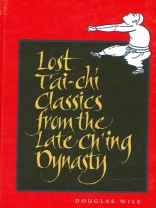Analysis of rich new material allows Wile to make a fresh survey of longstanding issues: the origins of T’ai-chi; the authorship of the classics; the differences between Wu, Yang, and Li; and the roles of such figures as Chang San-feng, Wang Tsung-yueh, Chiang Fa, and the formerly missing link, Ch’ang Nai-chou.
Douglas Wile translates and analyzes four collections of recently released nineteenth-century manuscripts on T’ai-chi ch’uan. These writings of Wu’s older brothers Ch’eng-ch’ing and Ju-ch’ing, and his nephew Li I-yu, together with the transmissions of Yang Pan-hou, represent a significant addition to the seminal literature. The rich new texts allow us to make a fresh survey of longstanding issues in T’ai-chi history: the origins of the art; the authorship of the ‘classics;’ the differences between Wu, Yang, and Li; and the roles of Chang San-feng, Wang Tsung-yueh, Chiang Fa, and the formerly missing link, Ch’ang Nai-chou. The original Chinese texts of the four new sets of classics have been appended for the convenience of Chinese readers and scholars.
The book reconsiders the world of the Wu, Yang, and Li families of Yung-nien and reconstructs it against the background of the Opium Wars, the Taiping Rebellion, and the decline of the Manchu dynasty. New biographical sources illuminate the domestic and political lives of the Yung-nien circle and their orientation to the late imperial intellectual trends. The development of T’ai-chi ch’uan in the nineteenth century is explored in the context of China’s cultural response to the challenge of the West and the role of body-centered arts in Asia during the drive for independence and the ongoing search for national identity.
表中的内容
Preface
Acknowledgments
Note on Transliteration
Note on Illustrations
Introduction
I Social and Historical Background of T’ai-Chi Ch’uan in the Nineteenth Century
China and the Nations
Rebellion at Home
The North China Plain
Elite Culture
Late Ch’ing Intellectual Trends
Reexamining the Biography of Wu Yü-hsiang
Approaches to Understanding Wu and Li Involvement in T’ai-chi Ch’üan
II Textual Tradition of the T’ai-Chi Classics
III Analysis and Translation of the New Texts
The Writings of Wu Ch’eng-ch’ing
Analysis of the Texts
Translation of the Texts
The Writings of Wu Ju-ch’ing
Analysis of the Texts
Translation of the Texts
The Writings of Li I-yü
Analysis of the Texts
Translation of the Texts
Yang Family Forty Chapters
4/1 Analysis of the Texts
4/2 Translation of the Texts
IV Significance of the New Texts
Authorship of the Previously Received Classics
Authenticity of the New Texts
Dijfferences between the Wu/Li and Yang Editions of the Classics
Authorship of the Bookstall Classics
Historicity of Chang San-feng
Historicity and Role of Wang Tsung-yüeh
Period and Role of Chiang Fa
Paucity of Theoretical Texts in Ch’en Village
Chang Nai-chou and the Wu/Li Classics
Survival of Manuscripts in the Wu and Li Families
Conclusion
Appendix I. Original Chinese Texts for the Lost Classics
Appendix II. Textual and Biographical Studies
Notes
Glossary
Bibliography
Index
关于作者
Douglas Wile is Associate Professor at Brooklyn College. He is the author of The Art of the Bedchamber: The Chinese Sexual Yoga Classics, Including Women’s Solo Meditation Texts, also published by SUNY Press.












